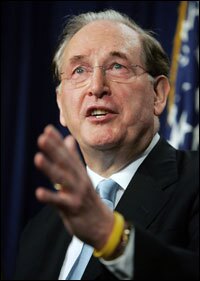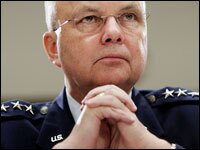This story is free to read because readers choose to support LAist. If you find value in independent local reporting, make a donation to power our newsroom today.
Timeline: CIA and Interrogation Videotapes



News that the CIA made and then destroyed videotapes of al-Qaida suspects undergoing harsh interrogations while in agency custody seemed to have come out of nowhere. However, the story has been unfolding for years, though largely out of public view. The controversy over the tapes spans several countries and involves Congress, federal prosecutors and the top leadership of the CIA.
Here are some of the key moments.
March 2002: Terrorism suspect Abu Zubaydah, allegedly a high-ranking member of al-Qaida, is captured in Pakistan and flown to an undisclosed CIA detention center. Zubaydah is said to be an organizer of the Sept. 11, 2001, attacks and a tcaop al-Qaida recruiter. The Bush administration portrays his capture as a major breakthrough.
2002: Abu Zubaydah and at least one other al-Qaida member are subjected to harsh interrogation techniques, possibly including waterboarding (controlled drowning), by their CIA captors. The agency videotapes several of these interrogations, partly to ensure that the techniques used are legal and partly to provide backup documentation of the information collected, according to CIA officials.
2003: The CIA's internal watchdog watches the videotapes and verifies that the interrogation practices were legal, according to CIA director Michael Hayden.
Also in 2003, the CIA informs Rep. Jane Harman (D-Calif.) and two other members of Congress of the tapes' existence.
August 2004: The 9/11 Commission completes its work on the terror attacks and the U.S. government's response to it. The commission had requested all relevant information from the CIA. But it never received videotapes of CIA interrogations conducted in 2002. An agency spokesman says the CIA "went to great lengths to meet the requests of the 9/11 Commission" and preserved the tapes in case the commission asked for them specifically.
2005: Lawyers representing terrorism suspect Zacarias Moussaoui make formal requests to the CIA for transcripts and other documentary evidence of the interrogation of agency prisoners. CIA lawyers tell prosecutors that the agency did not have such recordings.
Later in 2005, the CIA destroys at least two videotapes documenting the interrogation of two al-Qaida suspects in the agency's custody. The tapes showed CIA employees subjecting the suspects to harsh interrogation techniques. The tapes were reportedly destroyed at the request of Jose Rodriguez, then head of the agency's Directorate of Operations, its clandestine service.
November 2006: The Senate Intelligence Committee learns of the tapes' destruction, according to committee chairman Jay Rockefeller (D-WV).
December 2007: CIA Director Michael Hayden tells agency employees that the CIA destroyed videotapes it made in 2002 of two top terrorism suspects because it was afraid that keeping them "posed a security risk." If the tapes had become public, they would have exposed CIA officials "and their families to retaliation from al-Qaida and its sympathizers." Hayden makes the announcement hours after The New York Times informs the agency of its intention to publish a report about the tapes. Human rights groups and some members of Congress express outrage, accusing the agency of "destroying evidence." The Senate's second-ranking Democrat, Richard Durbin of Illinois, asks the Justice Department to investigate whether the CIA obstructed justice by destroying the videotapes.
Copyright 2022 NPR. To see more, visit https://www.npr.org. 9(MDA1OTI3MjQ5MDEyODUwMTE2MzM1YzNmZA004))








